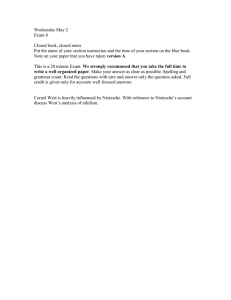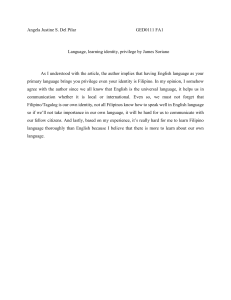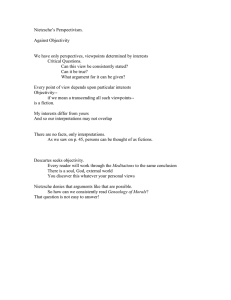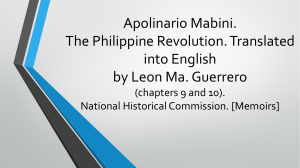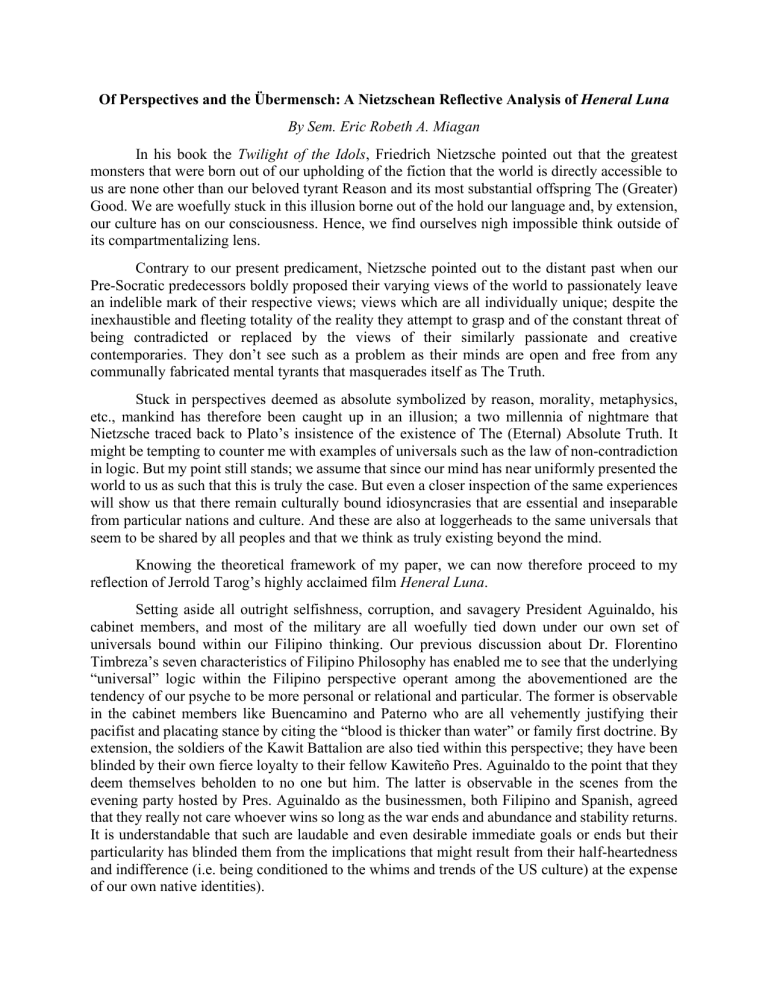
Of Perspectives and the Übermensch: A Nietzschean Reflective Analysis of Heneral Luna By Sem. Eric Robeth A. Miagan In his book the Twilight of the Idols, Friedrich Nietzsche pointed out that the greatest monsters that were born out of our upholding of the fiction that the world is directly accessible to us are none other than our beloved tyrant Reason and its most substantial offspring The (Greater) Good. We are woefully stuck in this illusion borne out of the hold our language and, by extension, our culture has on our consciousness. Hence, we find ourselves nigh impossible think outside of its compartmentalizing lens. Contrary to our present predicament, Nietzsche pointed out to the distant past when our Pre-Socratic predecessors boldly proposed their varying views of the world to passionately leave an indelible mark of their respective views; views which are all individually unique; despite the inexhaustible and fleeting totality of the reality they attempt to grasp and of the constant threat of being contradicted or replaced by the views of their similarly passionate and creative contemporaries. They don’t see such as a problem as their minds are open and free from any communally fabricated mental tyrants that masquerades itself as The Truth. Stuck in perspectives deemed as absolute symbolized by reason, morality, metaphysics, etc., mankind has therefore been caught up in an illusion; a two millennia of nightmare that Nietzsche traced back to Plato’s insistence of the existence of The (Eternal) Absolute Truth. It might be tempting to counter me with examples of universals such as the law of non-contradiction in logic. But my point still stands; we assume that since our mind has near uniformly presented the world to us as such that this is truly the case. But even a closer inspection of the same experiences will show us that there remain culturally bound idiosyncrasies that are essential and inseparable from particular nations and culture. And these are also at loggerheads to the same universals that seem to be shared by all peoples and that we think as truly existing beyond the mind. Knowing the theoretical framework of my paper, we can now therefore proceed to my reflection of Jerrold Tarog’s highly acclaimed film Heneral Luna. Setting aside all outright selfishness, corruption, and savagery President Aguinaldo, his cabinet members, and most of the military are all woefully tied down under our own set of universals bound within our Filipino thinking. Our previous discussion about Dr. Florentino Timbreza’s seven characteristics of Filipino Philosophy has enabled me to see that the underlying “universal” logic within the Filipino perspective operant among the abovementioned are the tendency of our psyche to be more personal or relational and particular. The former is observable in the cabinet members like Buencamino and Paterno who are all vehemently justifying their pacifist and placating stance by citing the “blood is thicker than water” or family first doctrine. By extension, the soldiers of the Kawit Battalion are also tied within this perspective; they have been blinded by their own fierce loyalty to their fellow Kawiteño Pres. Aguinaldo to the point that they deem themselves beholden to no one but him. The latter is observable in the scenes from the evening party hosted by Pres. Aguinaldo as the businessmen, both Filipino and Spanish, agreed that they really not care whoever wins so long as the war ends and abundance and stability returns. It is understandable that such are laudable and even desirable immediate goals or ends but their particularity has blinded them from the implications that might result from their half-heartedness and indifference (i.e. being conditioned to the whims and trends of the US culture) at the expense of our own native identities). By extension, the American liberators or, should I say, invaders are also blind to the established civilized and Christian character of our then budding Filipino nation. Being cultural inheritors of their former colonial master Great Britain and their philosophy of The White Man’s Burden (Rudyard Kipling’s poem), imperialism intoxicates them. Such is palpable as the few lines of John O. Sullivan’s Manifest Destiny about the US being the God-chosen nation who shall transport and propagate their successful enjoyment of liberty and democracy to the savage nations who they deem to be still not illuminated by such noble ideals. Ironically, as we have seen in the movie, the same lines were being narrated while the scenes show American soldiers savagely ravaged the Filipino populace – climaxing to indiscriminate murders. Worse, their messianic complex barred them from realizing that their romantic and glorified view of their pacification campaigns have led them to feel indifferent or even justified to commit gruesome atrocities (i.e. Balangiga Massacre). Sad to say the previous paragraphs’ issues about destructive particularism borne out of the ignorance of Nietzsche’s perspectivism continues to be experienced by our nation and our world in recent history. The rampancy of nepotism and favoritism that climaxes to cronyism and political dynasties shows us the continuing tight grip of the mindset of a perverted version of personal commitments. While our countrymen’s continuous gullibility toward simplistic and immediate promises like having a drug free nation after three to six months betrays the reality of our collective fixation on the immediacy of particularism rather than being sensitive to the bigger picture of implications and future non-immediate consequences. In the global scale, we have also recently experienced how destructive still the American messianic complex is. Just look at their abandonment of their failed decades of experimentation and exploitation of the Americanized but corrupt and inept Afghan state. Despite the seemingly universal blindness of what was touted as rational certainty among the personalities and groups in the film, there is still something worth applauding even by critics as stringent as Nietzsche himself. Especially since among them one dared to will to o beyond one’s (present) humanity to be the Superman/Overman or Übermensch. One dared to constantly swing from both his Apollonian) and Dionysian side to guide his fellowmen; he is Gen. Antonio Luna. On one hand, Luna can also be deemed as under the spell of this social constructs. His insistence on war as the sole solution to the issue of independence. He is not totally at fault though as his companions’ acts continuously reinforce his narrow view of dialoguing for peace as mere defeatist compromise. On the other hand, his passionate and reason-defying willingness to charge to the enemies in a hopeless battle combined with his ability to creatively think outside of the box in order to find the necessary workforce for his trench-building project shows him as someone who is in touch with his boundless, passionate and creative Dionysian aspect rather than be fixated to his Apollonian side of absolute adherence to mere social constructs of the totalizing Reason. Luna is aware if the hold of these social constructs. He himself experienced his tendency to also think in the lines of such constricting lenses of interpretation. Nonetheless, he is bold enough to transcend and even defy it especially during crucial moments as seen in the previously stated examples. In conclusion, Nietzsche’s notions of Perspectivism and the Übermensch has allowed me to treat our discovery of the characteristics of Filipino Thought not as a justification for a deterministic “This is who I am” mentality but as a challenging springboard to be aware of and to transcend from in recreating myself proudly and constantly to be the best I can be.
